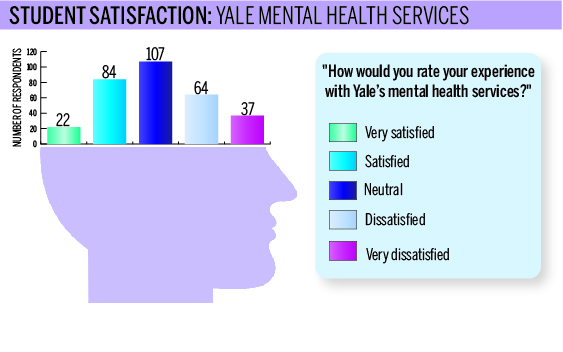
Lauren Quintela
As nationwide conversations about the happiness and mental health of university students continue, around a quarter of Yale undergraduate respondents to a News survey distributed last month said they sought mental health counseling at the University this academic year — and most of those students said they were less than satisfied with the experience.
Of those, about a third said they were “dissatisfied” or “very dissatisfied” with the care they received, another third reported feeling “neutral” about the experience and the same fraction of respondents said “satisfied” or “very satisfied.” The results of this survey were not adjusted for bias.
The Mental Health & Counseling department at Yale Health currently employs 27 clinicians who work with students across Yale College and other Yale schools, according to its website. Yale currently enrolls 12,312 students, meaning there are about 456 students per clinician — a number about five times lower than the average of 2,080 students per clinician at universities of comparable size, according to a 2016 report by the Association for University and College Counseling Center Directors.
Despite the fact that Yale has fewer students per clinician on average, most students interviewed by the News who said they sought mental health counseling cited long wait times for therapist assignments as the main reason for their frustration with the department.
Director of Yale Health Paul Genecin, who oversees Mental Health & Counseling, said that although demand for mental health services is surging nationwide, Yale has seen a particularly striking increase in the number of students seeking such services in recent years. Yale Health saw an 11 percent increase in students using its mental health services from 2016 to 2017 and expects those numbers to grow by a further 15 percent this year.
Each year, Genecin said, Mental Health & Counseling adds clinicians to address rising demand. Four additional clinicians will begin working at Mental Health & Counseling in time for the next academic year, bringing the total number of clinicians the department employs to 31.
“We do our best to address student mental health concerns and to ensure that we take care of urgent situations without delay,” Genecin said. “We are fortunate to be able to commit even more resources to the issue than many other institutions.”
According to the Mental Health & Counseling website, students requesting an appointment are given an initial time for evaluation within two to four week days, and, following that, most students must wait “a couple of weeks” more to see their assigned counselor.
Sometimes, however, the wait time is much longer, students interviewed said. Tasha Boyer ’19 said that when she called Mental Health & Counseling to schedule an appointment last fall, the department scheduled an initial meeting a month later. She had her first meeting with the professional assigned to her over a month and a half after that. Boyer’s residential college dean even contacted Mental Health & Counseling on her behalf in an effort to expedite the process, she added.
“The department’s substantial delay in pairing me with a professional was frustrating because I was going through a difficult time and felt that my situation was urgent,” she said. “I feel as though issues related to mental health should be prioritized even if the fall is ‘a busy time,’ as I was told by the department. I ended up going to the SHARE center, and they were immensely helpful because of their flexibility and experience with my situation.”
Some students interviewed said they ultimately sought counseling off-campus because of their problems with the Yale system.
Jasmine Kennedy ’20 said that compared to her therapist and psychiatrist at home, Yale’s counseling staff do not build as much of a “personal rapport” with patients. Even after months of counseling, she said, she felt the staff did not know her on a personal level, which is “really an important part of mental health services.”
Lucy Western ’19 said that she began seeking counseling at Mental Health & Counseling a year ago, when her mental health declined rapidly. Western recalls waiting nearly two weeks before she was assigned a therapist after going to see the on-call clinician, and several more weeks before she got to see a psychiatrist and was prescribed medication.
While she found the doctors she ultimately worked with helpful, Western said, she decided to seek mental health services elsewhere because of the problems with the Yale system — something she says she was “very privileged to be able to afford to do.” While her mental health is now under control, she said, she is unsure she would have gotten healthy if she had not been able to pursue help outside of Yale.
“The wait was agonizing, and I spent every day of those weeks crying for hours at a time and feeling abandoned by a system that had been marketed to me as functional. … That time remains devastating in my memory, and it feels like I went through a lot of unnecessary pain and stalling to get to where I am now,” Western said. “It seems to me that mental health services that are functional effectively do not exist.”
According to the Mental Health & Counseling website, half of all undergraduates obtain mental health counseling from Yale Health at some point during their four years at the University. The department offers individual, group and couples therapy.
Anastasiia Posnova | anastasiia.posnova@yale.edu







